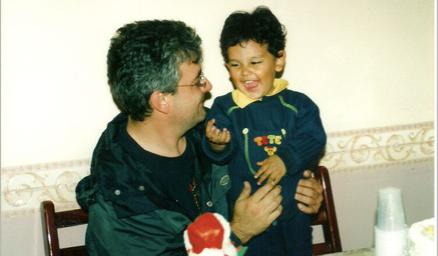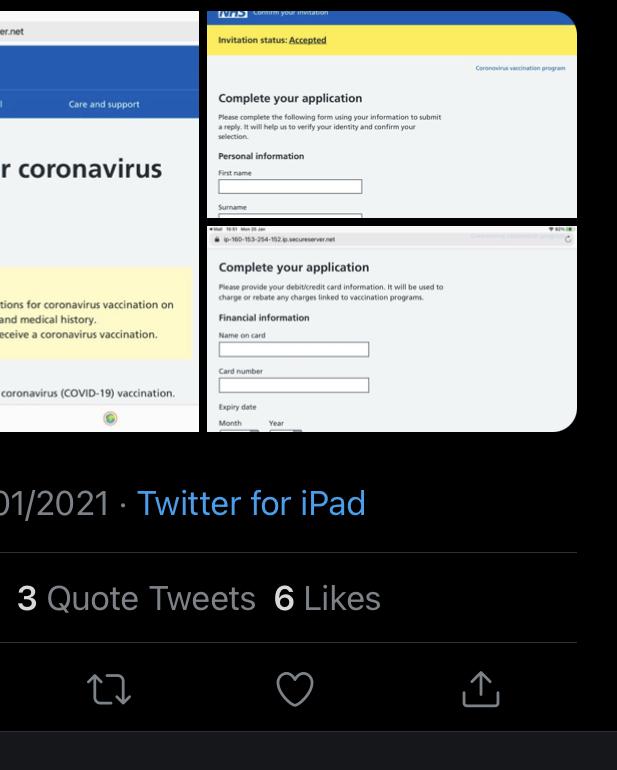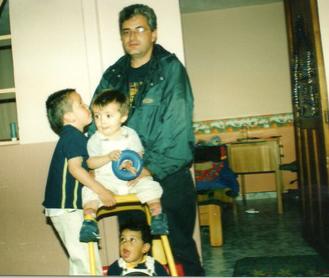
6 minute read
Tribute to family ‘giant
ABOVE: Jorge Capera with his uncle Joaquin Avellaneda FACING PAGE: Joaquín Avellaneda with his son and nephews © Claudia Capera
Advertisement
JORGE CAPERA shares his personal story
The oldest memory I have of my uncle is from one sunny morning when we were getting ready to go to a natural reservoir in the outskirts of Bogota, Colombia – my home country.
I must have been six or seven and I was staying with my cousin, uncle and aunty for the weekend.
My uncle was getting dressed while my cousin and I were watching some cartoons on the television.
But just as he was about to put on his shirt, I noticed for the first time ever that he had a big burn scar covering the upper part of his back. I looked up to the gigantic man and asked him with the curiosity of a six-year-old child how he had got it. He answered with the seriousness of a three-year-old child: “I got bitten by an elephant” and started laughing.
Two weeks ago, his laugh went quiet to be heard no more. He died of Covid-19 in a hospital 5,210 miles away from Liverpool, in Bogota. His death is one the 53,284 deaths related to Covid-19 registered in Colombia so far, and one of the 2, 212,868 registered worldwide. For many people those numbers may be just that: numbers.
But for me these deaths – including the 105,777 registered in the UK at the time of writing – represent many giants that will laugh no more. My uncle was huge. I remember he would be towering over me when I was a child. Once my cousins and I started to grow, he would complain because “we were going to leave him behind”, feeling like a dwarf. That never quite happened. I remember I was so excited when his jumpers started to fit me that I kept one of them for a couple of months until my mom made me to return it.
I just loved it. It had his vanilla and eucalyptus smell and would keep in its pockets all the receipts he had forgotten to throw away. I would breath deep whenever I had it on to feel his smell in my lungs. My uncle died connected to a
ventilator, unable to breathe for himself. He had entered the hospital a couple of weeks before and had been steadily recovering.
The situation was so hopeful that my mom and grandma had made some traditional Colombian Christmas food for all my aunty, my cousin and him. One of my cousins ate his portion after flying all the way from Italy for his funeral.
Amass was celebrated for my uncle last week. I attended it on Zoom and was only able to understand half of the words people said in it, due to the joys of technology.
His son gave a speech that ended up in tears and my cousin, who came from Italy, read a poem she wrote about how he has become one with the plants, trees and mountains that he loved so much, and all the teachings he is leaving behind. For me, these entail one dodgy driving lesson and many years of learning to never stop being childish and playful, regardless of your age. Many have said that the most vicious part of the pandemic is that many people have not been able to say bye to their loved ones – and for me that is true.
Nevertheless, technology shortens distances and even breaks the walls of hospitals down. In a short Christmas video my family and I were able to say to him that we were praying for his recovery and that we loved him a lot.
His answer was a short message thanking us for looking after his wife and son while he was in hospital, along with a question about how my grandma was doing and a reassuring report of the respiratory treatment he was going through.
That was Joaquín Avellaneda: a giant that cared for his family and never stopped being childish and funny; a giant that loved us a lot; a giant that was always looking forward to the next opportunity for making a joke about how he had been bitten by an elephant.
Virus scammers strike again
By LIAM KENNEDY
Criminals are using the Covid-19 vaccine as a way to trick people into sending them money. The fraudsters, pretending to be the NHS, are emailing individuals offering the vaccine whilst also trying to get them to hand over personal information.
Merseyside resident Val Spencer was contacted by the NHS fraudsters and admits she ‘nearly’ filled in the forms asking for her bank details.
“I nearly fell for it as I have cognitive issues, and now feel like a fool.
“I did fill in the form for my details but as soon as they wanted card details, I twigged that it was dodgy. I posted screen shots on twitter and they [her followers} put me right.”
The mother of three went on to say: “The scammers are nasty folk who deserve their day in court, it won’t happen though and now we’re outside the General Data Protection Regulation (GDPR) of the European Union I expect more scams like this, and I also expect this government to do nothing about it.
“The information commissioner is toothless and underfunded which is just how this government want this institution to be.”
Action Fraud, the national reporting centre for fraud and cyber-crime, said it received more than 1,000 complaints about scam emails on one day alone last week.
Labour and Co-operative councillor for Warbreck, Ann O’Byrne, said she has been contacted by ‘lots of people’ about the scam emails.
She said: “The e-mails are asking the reader to register for the vaccine and then asks for card details when registering. The NHS will never ask for this.
“Unscrupulous people often use emergencies, such as the pandemic, to scare people into making rash decisions and that’s when we can be caught off guard and fall victim to a scam.”
In 2019 Lloyds Bank found that young people were falling victim to scams, more than any other age group. But they also found that people over the age of 55 are handing over the most money out of any age group.
Ms O’Byrne, who recently announced that she has put herself forward to be Labour’s candidate in the mayoral race to replace Joe Anderson, added: “Having money stolen not only causes financial hardship, when many people are already struggling, but it can be a deeply upsetting experience, leaving victims feeling distraught and anxious.
“If you’ve been a victim of fraud, Citizens Advice can support you.”
In a separate scam, fraudsters are targetting travellers across Europe offering fake Covid test certificates at airports, stations and online. Interpol has also issued warnings of criminals selling fake coronavirus vaccines.
Liverpool City Council have also released additional information regarding the scams and how to identify whether an email is actually from the NHS or from fraudsters. http:// liverpool.gov.uk/covidscams
You can also use the Citizens Advice online scams helper to check if something might be a scam http://citizensadvice.org. uk/consumer/scams/check-if-somethingmight-be-a-scam/
Consumer magazine Which? has advice on their website about email scams: http:// which.co.uk/consumer-rights/advice/howto-spot-an-email-scam












